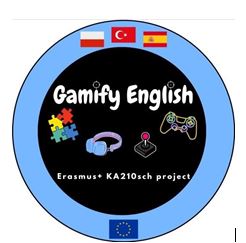
GAMIFY ENGLISH
Erasmus + Small Scale Partnership Project
TURKİYE MOBILITY (4-8 March, Denizli)
NEZİHE DERYA BALTALI SCIENCE AND ART CENTER PRESENTATION
- Nezihe Derya baltalı Science and Art Center was founded in 2001 in Denizli, Turkey.
- It has been one of the oldest Science and Art Centers which provides specialized education for individuals who have been identified as gifted by the National Ministry of Education.
- It has currently 685 students and 27 teachers.
- It provides education in three main fields: General talent, Music and Art.
- It implements a project-based education program,
- The students start carrying out scientific projects when they become 9th grade.
- The centre aims to enhance students’ 21st century skills and talents,
- In language classes an interdisciplinary approach embedded with science is employed and
- teaching English in an enjoyable and effective way is prioritized.
CASE STUDIES CONDUCTED IN THE FIELD OF
GAMIFICATION OF ENGLISH
Gamification in English Language Classrooms: The Case of Kahoot!
(Kıyançiçek, E., Uzun, L., 2022)
- In this study, teaching English by using Kahoot! is examined and the benefits of the application in assessment is presented.
- Kahoot! is a free mobile application that is accessible for teachers from different disciplines and can be used at various levels.
- It can be used as a warm-up activity, a dignostic activity and for assessment as well.
- It encourages active, cooperative, constructive, authentic, and purposeful language learning.
Development of a Gamification Based
English Vocabulary Mobile Learning System
(Boyinbode, O., 2018)
- In this study, a mobile learning system was developed to foster English vocabulary learning.
- The application was equipped with necessary game functions for English vocabulary learning.
- Experimental results revealed that the developed system has significantly enhanced learners’ English vocabulary abilities and promoted learning interests.
- More significantly, the system facilitated a seamless mobile learning environment for English learning without constraints of time or place imposed by classroom learning.
The Pedagogical Use of Gamification in English
Vocabulary Training and Learning in Higher Education
(Panmei, B., & Waluyo, B., 2022)
- In this quasi-experimental study, it was aimed to investigate the effects of gamified vocabulary learning using an application called Quizizz.
- A control and experimental group were involved in the study to examine the effect of gamification on vocabulary learning and learner autonomy of the participants.
- Findings revealed that experimental group showed a higher performance in vocabulary learning compared to the control group.
- There was no significant change in learner autonomy of the participants in vocabulary learning.
Effects of Gamification in English Language Learning:
The Implementation of “Winner English” in Secondary
Education in Thailand
(Kriangkrai, V., 2022)
- This study explores how gamification contributes to student performance and perceptions through the “Winner English” program.
- The program was designed primarily to be self-paced but has been adapted to be used as a part of compulsory classes at school.
- Totally 1556 students were involved in the study as control and experimental groups.
- The post-test results showed a vast improvement to English performance by the experiment group once the program was integrated into English classes.
Understanding how gamification of English morphological analysis in a blended learning environment influences
students’ engagement and reading comprehension
(Qiao, S., Wah, Chui, S., K., Yeung, S., S., 2023)
- In this study, a computer-based gamified approach was developed specifically to improve English morphological analysis to be integrated into teaching process with blended learning.
- A mixed methods approach was used to examine the effectiveness of this blended gamified programme on improving students’ learning engagement and reading comprehension when compared to a conventional face-to-face, non-gamified method of teaching.
- Findings showed that the group with blended gamified programme performed significantly better on English reading comprehension than the face-to-face, non-gamified group and qualitative findings were also found to support these results.
REFERENCES
Boyinbode, O. (2018). Development of a Gamification Based English Vocabulary Mobile Learning System, International Journal of Computer Science and Mobile Computing, 7(8), 183-191.
Kıyançiçek, E., & Uzun, L. (2022). Gamification in English Language Classrooms: The
Case of Kahoot!. Bilim Eğitim Sanat Ve Teknoloji Dergisi, 6(1), 1-13
Panmei ,B., Waluyo, B. (2023). The Pedagogical Use of Gamification in English Vocabulary Training and Learning in Higher Education. Education Sciences, 13(1), 1-22.
Qiao, s., Wah Chu, S., K., & Yeung, S., S. (2023) Understanding how gamification of English morphological analysis in a blended learning environment influences students’ engagement and reading comprehension, Computer Assisted Language Learning.
Vathanalaoha, K. (2022). Effects of Gamification in English Language Learning: The İmplementation of Winner English in Secondary Education in Thailand,
Language Education and Acquisition Research Network, 15(2), 830-857.
